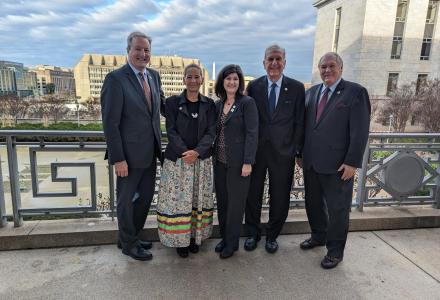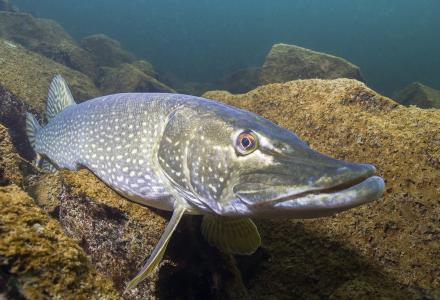


Management of the Detroit River and western Lake Erie is complicated by the fact that these are shared waters between Canada, the United States, one province and two states.
The complex management of the river makes ecosystem-based management challenging because of the many legal frameworks, jurisdictional authorities, institutional arrangements and governance, coordination of research and monitoring and ecosystem health assessments involved. Despite these challenges, stakeholders have developed an innovative, grassroots initiative that furthers transboundary ecosystem-based management: State of the Strait (SOS) conferences.
SOS is a Canada-United States forum held every two years that brings together governmental managers, researchers, students, businesses, members of environmental and conservation organizations, and concerned citizens to address environmental issues and foster ecosystem-based management of the Detroit River and western Lake Erie.
The conference venue alternates between Canada and the United States, and a binational steering committee organizes each event and chooses the meeting’s theme. SOS conferences are designed to provide independent advice to strengthen science-policy-management linkages and support ecosystem-based management.
This can best be described as an organic initiative driven by local stakeholder groups.
Throughout a 24-year history, SOS conferences and reports have brought about change. The 2000 conference led to 53 soft engineering projects over 20 years. Conferences in 1998 and 2010 were a catalyst for 10 sturgeon spawning reefs. The 2012 conference promoted greater use of remote sensing and geographical information system technologies, while the 2018 conference helped secure an Urban Bird Treaty designation for Detroit.
The most-recent SOS conference at the University of Michigan-Dearborn in May 2022 addressed contaminated sediments in the Detroit and Rouge rivers.
In the Detroit River, 6.7 million cubic yards of contaminated sediments are limiting further recovery of the river and have been targeted for remediation by governments. More contaminated sediments exist in the lower Rouge River. The conference focused on what led to the sediment contamination and what needs to be done to further science-based contaminated sediment remediation, including creative and collaborative financing. A conference report will be released in early 2023.
No registration fees are charged for SOS conferences to encourage broad participation. Each event supports student attendance, especially from underserved schools, to inspire the next generation of scientists and resource managers. SOS has a strong record of sponsorships, both small and large, to cover the cost of the conferences and preparation of conference reports.

Students participating in the 2022 State of the Strait Conference. Credit: Molly Manley, University of Michigan-Dearborn
Additionally, SOS offers fellowships for university students, including from the Rackham Graduate School at the University of Michigan and the Cooperative Institute for Great Lakes Research, along with internships from the University of Windsor.
Findings and recommendations from SOS reports are published in scientific literature. The peer-reviewed publications help further share scientific knowledge and management experiences and help university faculty and institute researchers highlight the value of their involvement.
However, working across borders is not easy and presents challenges, such as funding, sustaining sponsors and recruiting new ones, succession planning for leadership, and communicating the value and benefit of SOS conferences to governments to have them return as sponsors and participants.
SOS consistently receives media coverage and raises awareness of pressing ecosystem problems. The University of Windsor’s Great Lakes Institute for Environmental Research plays a key role in conference continuity, including hosting the conference website and report archives, and providing steering committee leadership.
The success of State of the Strait shows the potential for community-driven international networks that strengthen science-policy-management and can provide lessons for other efforts aimed at integrating monitoring, research and modeling as part of adaptive ecosystem-based management.

John Hartig is a visiting scholar at the University of Windsor’s Great Lakes Institute for Environmental Research, where he studies the cleanup and restoration of Great Lakes Areas of Concern. Hartig has been involved in SOS conferences since their inception in 1998 and served as co-chair of the 2022 conference.

Casey Godwin is an assistant research scientist at the University of Michigan’s Cooperative Institute for Great Lakes Research, where he studies the impacts of nutrient loadings on biogeochemical processes in the Great Lakes. Godwin served as co-chair of the 2022 SOS conference.


